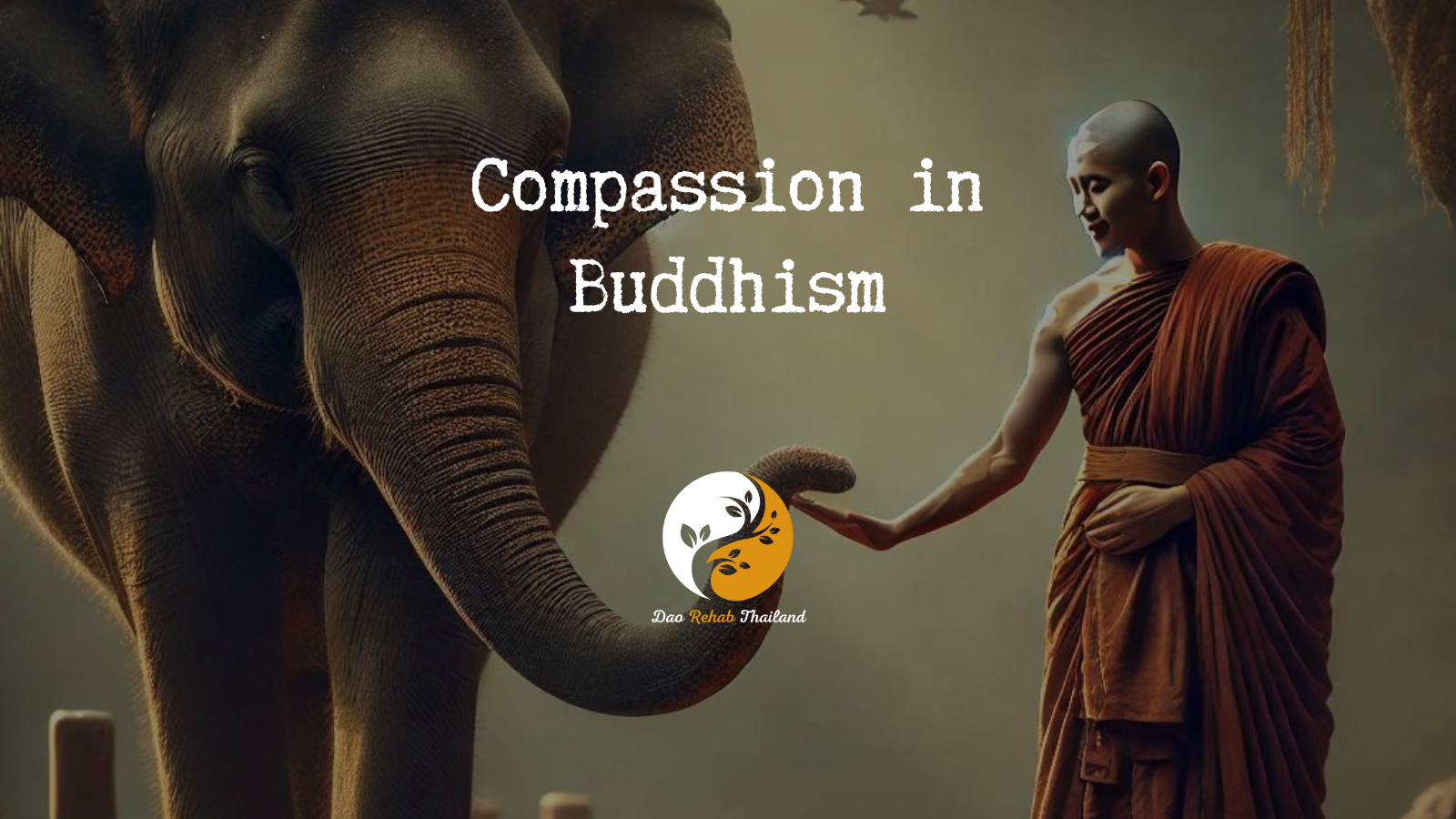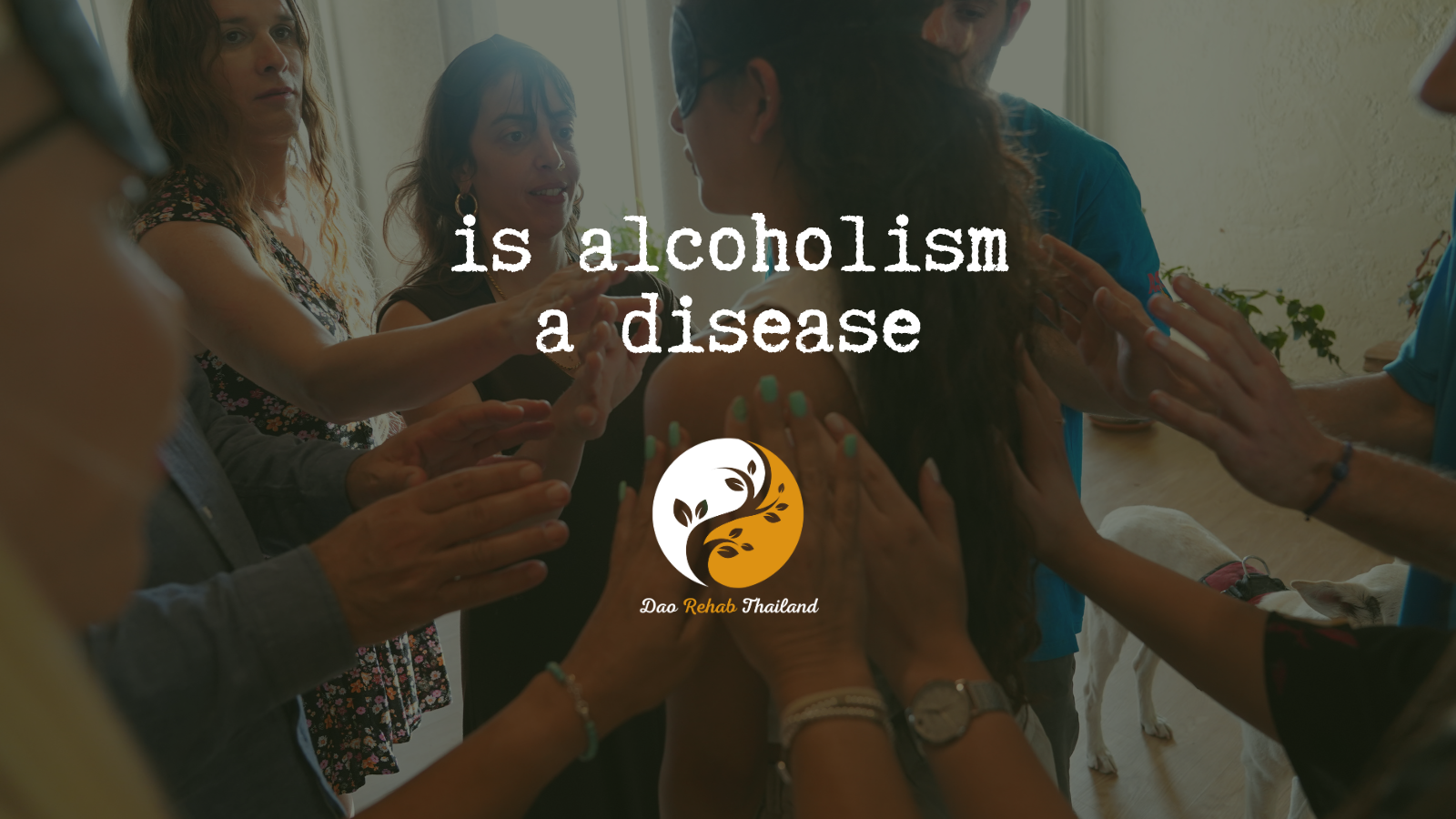
Compassion in Buddhism
Compassion in Buddhism
“Turning the impossible into possible”

"Detox from Drugs at a Luxury Holistic Center in Thailand and Israel"

Compassion in Buddhism
Compassion is one of the central principles of Buddhism and reflects the heart of the Buddhist path. The concept of compassion in Buddhism is not merely moral or idealistic but is based on a deep understanding of reality and the close connection between all beings. It is seen as a way to reduce suffering in the world and as a means to achieve spiritual liberation.
"Holistic Center for Trauma, Addiction, and Mental Imbalance Treatment in Thailand"
“Come to the beginning of your journey to freedom from addiction to alcohol, drugs, and pills, and rediscover your life within the serene embrace of DaoTherapy Rehab in Thailand—where holistic healing meets empowering recovery.”
DaoTherapy Holistic Rehab
Key Elements of Drugs Detox:
Medical Supervision: Drugs detox must be conducted under medical supervision, as the body may experience withdrawal symptoms. These can include nausea, anxiety, muscle aches, and insomnia. A medical team will monitor and manage these symptoms to ensure the patient’s safety and comfort.
Holistic Therapies:
Holistic Therapies: Many detox programs incorporate holistic therapies such as mindfulness, yoga, and meditation to help individuals cope with stress and anxiety during the detox process. These therapies support the mind-body connection and contribute to overall recovery.
Tapering Process
Tapering Process: Drugs detox often involves a gradual tapering of the drug to reduce withdrawal severity. Doctors will slowly decrease the dosage over time to allow the body to adjust to lower levels of the substance.
Psychological Support:
Psychological Support: Like any addiction recovery process, detox from Drugs includes psychological support. This can involve counseling, therapy, or support groups to address the mental and emotional aspects of addiction.
Post-Detox Treatment:
Post-Detox Treatment: After completing detox, continuing treatment is crucial to prevent relapse. This often includes participation in ongoing therapy, group support, and the development of new coping strategies to maintain sobriety.
Compassion in Buddhism
In the Buddhist tradition, the issue of compassion is very, very central. The dharma approach says that if all practices aimed at raising awareness – developing mindfulness, bringing insights, bringing greater clarity and lucidity – are not wrapped in or saturated with the quality of compassion, acceptance, and love, they may even be destructive practices. To that extent. Buddhism offers a variety of ways to develop compassion, through meditations and spiritual practices that aim to connect a person to the suffering of others and encourage positive action to alleviate this suffering.
The Buddha likened knowing how to relate to the dharma to knowing how to catch a snake: if we grab a snake by the tail, it will rise and bite us; we need to know how to catch it by the head. The same applies to how to use the dharma, how to use the awareness and insights that develop in us during practice. Within the framework of karma, acts of compassion are seen as positive actions that accumulate and contribute to a good impact on future incarnations and current lives.
Developing and cultivating mindfulness is sometimes like looking at ourselves and those around us under a magnifying glass. Patterns and patterns and habits and ways of thinking become very large, and we see them with an almost distorted intensity. If we do not simultaneously develop gentleness, acceptance and compassion, this can be destructive. Tradition equates the practice of awareness and mindfulness and the cultivation of compassion and love to the two wings of a bird. And just as a bird cannot fly with one wing, so too we cannot develop in practice and on the spiritual path if we do not also develop the wing of compassion and acceptance, gentleness and softness.
In Buddhism, compassion (*Karuna*) is one of the four heavenly qualities of the heart, and it is a central core of Buddhist philosophy and practice. Compassion is defined as the desire to reduce and alleviate the suffering of others and improve their well-being. Buddhism identifies life with suffering and offers compassion as a way to deal with inevitable suffering, alleviate it, and strive for liberation from it.

contact us
Contact us with your questions
We would love to speak with you! Feel free to reach out with any questions.

get in touch
Schedule a free consultation
Schedule a free consultation with our team and let’s make things happen!
"Implementing mercy in our daily lives"
Compassion in Medicine
The lecturer, a physician who became the personal physician of the Dalai Lama, reflects on how this role has demonstrated compassion in practice. He shares insights into the need for compassion not only in times of need but also as a constant in calmer times, comparing it to the need for medicine whether in sickness or in health.
Compassion as a Trait That Can Be Trained
Compassion, described as a deep feeling in the heart, is something that exists in everyone but is also a quality that can be improved through training. The lecturer discusses the importance of developing tools to cultivate compassion, which can be undermined by negative emotions such as anger, jealousy, and pride.
Techniques for Managing Negative Emotions
Certain methods for managing and reducing anger are described, including the “imaginary cloud” technique, in which emotions that precede anger are imagined as a cloud that disappears, as if symbolizing the release of those emotions. This method, although not immediate in its effect, promises gradual improvement through consistent practice.
Practical applications in life and ethical considerations
The possibility of implementing compassion training programs in high-stress work environments and workplaces is being considered, with suggestions such as emotional hygiene programs and healthy self-confidence.
Research supporting natural compassion
In support of the claim that compassion is a natural human condition, a study from the University of Wisconsin, Madison is presented in which infants were examined who clearly displayed a choice for compassionate behavior in observed scenarios. The study indicates that humans are born with a predisposition to compassion.
Compassion in Buddhism: A Deep Look
Compassion is one of the central principles of Buddhism and reflects the heart of the Buddhist path. The concept of compassion in Buddhism is not only moral or idealistic but is based on a deep understanding of reality and the close connection between all beings. It is seen as a way to reduce suffering in the world and as a means to achieve spiritual liberation.
The Philosophical Context of Compassion
In Buddhism, compassion (Sanskrit: *Karuna*) is a deep emotion that expresses the desire to reduce the suffering of others. It is related to *Metta*, which is unconditional loving-kindness directed towards all beings without distinction. This concept is influenced by the idea that all beings are connected to each other through the cycle of suffering called *samsara*, from which all strive to be free.
Embedding Compassion in Buddhist Practice
Buddhist practice cultivates compassion through various meditations that aim to develop sensitivity to the suffering of others. *Tonglen* meditation, for example, teaches you to breathe in the suffering of others and breathe out well-being and relaxation. This practice works to reduce the ego and develop the ability to connect and identify with the suffering of others.
Compassion and Karma
In Buddhism, there is also a connection between compassion and the concept of karma. Acts of compassion are considered good actions that accumulate in a person’s karmic account and contribute to a better incarnation in the future. This is a moral aspect that strengthens the desire to do good and act for others.
Compassion as part of coping with suffering
Buddhist philosophy warns that life is inevitably full of suffering. Compassion, in this context, is a way to cope with and reduce suffering, even if it cannot be completely escaped. It serves as a tool for a deeper understanding of reality and to develop interpersonal relationships based on support and care.
Examples of compassion in action
In the modern world, Buddhist figures such as the Dalai Lama and Thich Nhat Hanh serve as examples of a life of compassion in action. They demonstrate how these principles can be lived on a daily basis and inspire people around the world to live more compassionately and thoughtfully.
A Deeper Meaning of Compassion
Ultimately, compassion in Buddhism is not just an emotion or an action, but a state of being that comes from recognizing the unity of existence and the human duty to act for the greater good. It invites a shift from self-centered and egotistical thinking to thinking that considers others and the environment, and forms the basis for a more complete and balanced way of life.
Compassion and Karma: Examples and Applications in Buddhism
Understanding the connection between compassion and karma in Buddhism focuses on how acts of compassion can improve a person’s karma and positively impact their next incarnation and their current life. Here are ten examples of how acts of compassion and karma manifest in actions:
1. Helping the Needy – The act of giving to people in need or to charitable organizations, in which you dedicate your time, money, or other resources to helping others in need.
2. Teaching the Way to Others – The act of imparting knowledge and wisdom about spiritual and moral practices to others, while promoting their personal and spiritual development.
3. Intervening in Abuse – The act of preventing violence or abuse against animals or people, in which you protect the weak and the exploited.
4. Volunteering in the Community – Acts of compassion expressed through volunteering at community centers, hospitals, homeless shelters, or other institutions that aim to help the community.
5. Environmental Cooperation – Actions to preserve and nurture the environment, such as planting trees or cleaning beaches, aimed at ensuring a better future for all beings.
6. Emergency Relief – Providing first aid or support during and after natural disasters, where people save lives and help victims recover.
7. Developing Patience – Practicing patience with others, especially in situations where people have difficulty understanding or accepting their behavior, is an example of compassion that affects karma.
8. Emotional Support – Listening to and emotionally supporting people who are going through difficulties or crises in life, such as illness, loss, or despair.
9. Spreading Buddhism and Spiritual Practice – Teaching Buddhist principles and the actions of compassion and karma to others in order to encourage shared spiritual practice.
10. Forgiveness and Releasing Anger – An act of compassion that releases anger and frustrations toward others is the basis for improving karma by releasing emotional blocks and spiritual progress.
Each of these examples expresses the principle of acts of compassion and their effect on a person’s karma and their environment. They demonstrate the inseparable connection between the good we do and the positive results it brings, both in a spiritual and practical sense.
Compassion as a Response to Suffering: Examples of Practice
Compassion as a response to suffering is based on recognizing the pain and distress of others and being willing to act to alleviate them. Here are some examples of practices that can develop and strengthen the ability to respond compassionately to suffering:
1. Tonglen meditation – a Tibetan meditation in which the practitioner “takes in” the suffering of others by breathing in and “returns” them to well-being and relaxation by breathing out. This is a medical technique that aims to alleviate the suffering of others while developing feelings of empathy and compassion.
2. Sensitive conversations – taking time to talk to someone who is suffering, listening to them very attentively and trying to understand their situation and feelings. Sensitive conversations can be important support for the person suffering.
3. Volunteering in care and assistance institutions – for example, volunteering in hospitals, adult care centers, shelters for victims of domestic violence, etc. This volunteering allows you to alleviate the suffering of others through direct action.
4. Spiritual retreats – retreat experiences that focus on developing compassion and empathy, such as Buddhist retreats or mindfulness retreats.
5. Reflective writing exercises – writing about experiences in which you have encountered and dealt with the suffering of others, or writing about your own feelings and reactions to that suffering to explore and deepen your compassionate response.
Psychological Support:
Psychological Support: Like any addiction recovery process, detox from Subutex includes psychological support. This can involve counseling, therapy, or support groups to address the mental and emotional aspects of addiction.
Self-Examination Questions for Practicing Compassion
To assess and improve your ability to practice compassion, it is important to regularly self-examine. Here are some questions that can help you self-examine your ability to demonstrate compassion:
1. What was the most significant moment of compassion I experienced this week?
How did I feel during and after that moment? What was the result of my act of compassion?
2. Was I attentive to the needs of others today?
When did I feel like I could be more connected or giving to others?
3. What challenges have prevented me from demonstrating compassion?
Have there been times when anger, frustration, or self-interest have overtaken my ability to be compassionate?
4. In what ways can I improve my ability to demonstrate compassion?
Are there certain practices, such as meditation or reading, that can help me be more connected to others?
5. How do I deal with negative emotions that prevent me from being compassionate?
What methods or techniques work for me to manage such emotions?
6. Could I identify a person or group who needed compassion more than others?
How can I include and help them in a practical way?
7. What effect has practicing compassion had on my sense of self?
Have I found that practicing compassion increased my sense of fulfillment or inner peace?
8. Are there times when I have shown compassion only to receive appreciation or recognition from others?
How can I develop a more authentic approach that is less dependent on the reaction of others?
These questions are designed to help you think about practicing compassion in your life, identify the opportunities and challenges along the way, and find ways to make compassion a more natural and meaningful part of your daily life.
Quotes attributed to Buddha that deal with the subject of compassion:
1. “Compassion is the closest action to God.”
This quote emphasizes the spiritual importance and purity that compassion brings with it, and its power to bring us closer to self-realization and peace.
2. “Compassion is what elevates us above the human level and brings us closer to spirituality.”
This quote indicates the ability of compassion to elevate us to a higher level of understanding of human existence.
3. “As a mother protects her only child in her life, so all beings should be protected with a compassionate heart.”
Buddha compares the compassion we should show to every living being to the love of a mother for her child, to demonstrate the strength and sincerity required of true compassion.
4. “Do not identify yourself with evil, make a distinction between yourself and evil; perceive compassion as a way of dealing with every being.”
Buddha emphasizes that compassion is not just a response but also a starting point for all human conduct and dealing with the world.
5. “He who is separated from compassion cannot see the truth.”
Here the Buddha argues that without compassion, one cannot attain true understanding or reach deep spiritual insights.
These quotes reflect the view of compassion as an integral component of the Buddhist path to liberation and spiritual perfection, and emphasize its positive impact on the individual and society.








